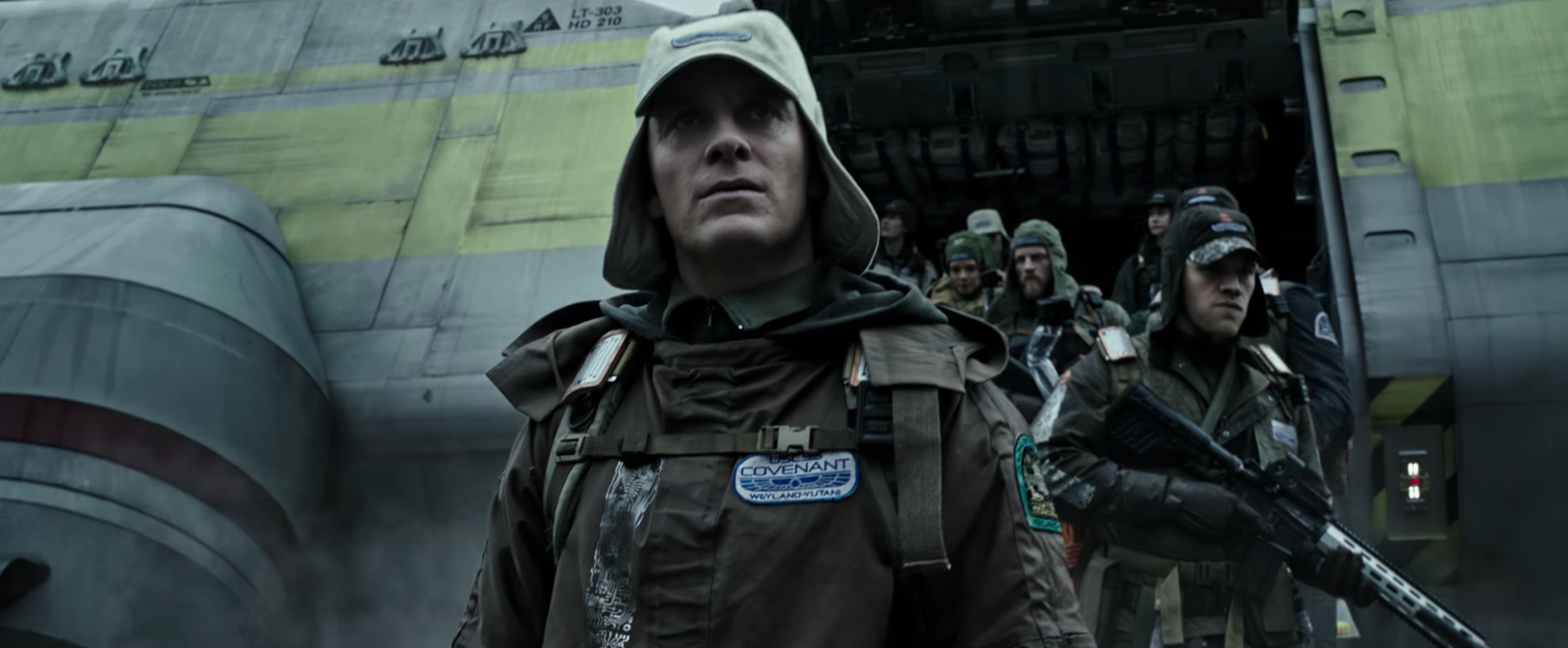By Mark Saldana
Rating: 3 (Out of 4 Stars)
After receiving mixed critical responses for his Alien prequel, Prometheus, filmmaker Ridley Scott has returned to the franchise with a follow-up prequel that plays more like a traditional Alien film, but also bridges the gap between its more cerebral and experimental predecessor and the franchise fans know and love. Alien: Covenant takes places eleven years after the last events of Prometheus, continuing some of that story arc, and heading closer to the events of the very first film. Though going more traditional may not offer audiences anything strikingly new or original, it still makes for gleefully creepy popcorn cinema. In addition, Scott and his writers manage to take the Prometheus arc into more fascinating and horrifying territory, resulting in a more compelling and satisfying film.
The year is 2104, and the colony ship Covenant is on a lengthy mission to distant planet Origae-6. With two-thousand colonists and one-thousand human embryos aboard, the ship’s crew, under the guidance of synthetic Walter (Michael Fassbender), have a tremendous responsibility to arrive safely to their destination. After an unexpected shock wave damages the ship, Walter awakens the sleeping crew to deal with the situation. As the repairs commence, the ship receives a somewhat garbled transmission from a seemingly human source. The crew traces the origin to an unknown planet which appears safe for human habitation. Led by Captain Christopher Oram (Billy Crudup) and Daniels Branson (Katharine Waterston), a team lands on the mystery planet to seek out the source of the transmission and assess the planet as a possible alternative for colonization.
With a screenplay by John Logan and Dante Harper (based on a story Jack Paglen and Michael Green), director Ridley Scott has made a new Alien prequel installment that gets the franchise back on track. While not as ambitious or bold as Prometheus, and not as groundbreaking or exciting as the first three films of the saga, Alien: Covenant still makes for a thrilling and frightening cinematic experience. Some of the typical claustrophobic alien attack sequences are there. They may not have the same impact as the first films, but they still work decently. Scott also includes the expected visceral gore which still succeeds in making me curl up in my chair. The seasoned veteran filmmaker has obviously honed his skills through the years and simply knows how to build suspense and deliver chills and shocks like they’re part of his muscle memory.
Scott also uses his budget and resources well, particularly his talented crew which help him create the visuals and sensual stimuli of both exquisite and nightmarish varieties. Ridley Scott and his team just know how to make a gorgeous looking and amazing sounding movie and it definitely completes the overall experience. High praise must also be extended to cinematographer Darius Wolski, composer Jed Kurzel, editor Pietro Scalia, and all of the art design, production design, and effects crews. The filmmakers can also can boast a talented ensemble cast that performs well.
In addition to a competent and sometimes vulnerable performance by Billy Crudup, Katharine Waterston impresses as the second-in-command Daniels. She may not be as defiantly strong as Sigourney Weaver’s Ridley, but Waterston’s Daniels must channel some inner strength of her own while dealing with so many aspects of her world falling apart in the face of harrowing danger. As the rest of the crew, actors Danny McBride, Demian Bichir, Carmen Ejogo, Jussie Smollett, Callie Hernandez, and several others offer solid performances. The real star of this movie, though (as he was in Prometheus), is the uber-talented Michael Fassbender and he gets to exercise his acting chops in some truly exciting ways.
Fassbender not only portrays Walter, a synthetic upgrade that follows orders better, he also reprises his role as the synthetic David, the only survivor of the failed Prometheus mission. Fassbender performs wonderfully and sublimely in both roles, bringing striking differences to both of the characters. He certainly is creepy and unnerving as David, though. David’s often icy-cold and calculating confidence just never feels right and always succeeds in delivering unglued feelings within me. In my opinion, Fassbender’s tremendous work in this movie is the top reason for seeing this movie.
So, even though this movie doesn’t serve as a major breakthrough in the series (and doesn’t seem to attempt to do this), Alien: Covenant manages to take the ambitious, but messy elements of Prometheus and redirects the material into a much more familiar, but steadfast formula. Those expecting something new and innovative might be disappointed with Ridley Scott and his writers revisiting what some may consider prosaic material. However, after so many years and a sloppy attempt at something bold and different, it is comforting to see an Alien movie being simply an Alien movie. I would compare this new installment to The Force Awakens of the Star Wars franchise. It may be formulaic, but it is a welcome revisit to a place fans can call home. And now that everyone is home, the saga may continue to something hopefully a little different, but not so outlandishly different that it doesn’t belong at all (see Alien: Resurrection).
